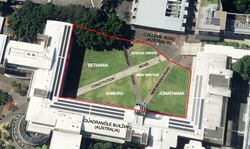New South Scotland
New South Scotland
Helen Maguire Lawn, Quadrangle Lawn, Nya Ystad | |
|---|---|
Crown Dependency of Austenasia | |
 New South Scotland, 2024 | |
| Established | 19 November 2012 |
| Transfer to Austenasia | 25 January 2013 |
| Zealandian administration | 3 June 2014 |
| Austenasian administration restored | 10 September 2016 |
| Government | |
| • Type | Indirect imperial rule |
| • Emperor | HIM Aggelos I |
| • Governing Commissioner | Rt Hon Sir Hugh McFarlane KCA |
| Area | |
| • Total | 3.3 km2 (1.3 sq mi) |
| Elevation | 35 m (115 ft) |
| Population (2024) | |
| • Total | 4 |
| • Density | 0.825/km2 (2.14/sq mi) |
| Demonym | New South Scottish |
| Time zone | UTC+10 (Austenasian Eastern Standard Time) |
| • Summer (DST) | UTC+11 (Austenasian Eastern Daylight Time) |
| Website | http://newsouthscotland.weebly.com/ |
New South Scotland (known in Australia as Helen Maguire Lawn or Quadrangle Lawn and known in the former Zealandia as Nya Ystad) is an Austenasian Crown Dependency situated on the eastern seaboard of the Australian continent. Between June 2014 and September 2016, the polity was administered by the Commonwealth of Zealandia, although de jure Austenasian sovereignty over New South Scotland continued to be acknowledged. De facto Austenasian rule was restored to the Crown Dependency that same month with the appointment of the territory's first Austenasian Governing Commissioner. A territorial constitution was promulgated in April 2020, handing the Crown Dependency its own system of local governance. New South Scotland has remained under the exclusive political authority of its Governing Commissioner since the restoration of Austenasian administration in 2016.
History
Early History (2012-2013)
Established on 19 November 2012 as a colony of New Wessex, having formerly been part of an Australian university campus, the colony was ceded to the Empire of Austenasia on 20 January 2013 by Declan I upon the ascension of Jonathan I to the Austenasian Throne. New South Scotland was formally made a Crown Dependency of Austenasia on 25 January, by the First Imperial Decree of HIM Emperor Jonathan I. The then Haakon Lindstrom, also monarch of the nearby nation of Zealandia, was appointed New South Scotland's Governing Commissioner.
A notable incident took place on 30 October 2013, when two constables of the New South Wales Police were escorted out of New South Scotland by a constable of the New South Scotland Constabulary after they were found asking individuals for identification in a rude manner. The New South Scottish constable was helped by a group of socialists visiting from Australia, who sung the Internationale as the two NSW constables were escorted out.
Zealandian Period (2014-2016)
On 22 May 2014, Lindström - who reigned by the regnal name of Astrid as Queen of Zealandia - ordered the Zealandian military to prepare an invasion of New South Scotland. A false version of events was reported to the Austenasian government, which were that Queen Astrid had been threatened with a coup by rogue elements of the Zealandian military and that she would be deposed unless she sanctioned an invasion of New South Scotland. The queen notified the Austenasian government of her apparent inability to suppress the rebellion, which was eventually allegedly pacified by an agreement by which use of half of New South Scotland would be granted to the Zealandian military in exchange for the force's annexation of new territory for the Crown Dependency. However, Lindstrom failed to pass on information to her government in regards to the Empire's wish for a deal, and instead willingly passed on misinformation, falsely accusing Austenasia of hostile designs on Zealandia and provoking her government into going ahead with an invasion of New South Scotland. Before Austenasia had a chance to respond militarily, a massive diplomatic backlash from the intermicronational community forced Zealandia to accept a compromise whereby New South Scotland would be administered independently by the Zealandian queen, but remain under formal Austenasian sovereignty.
Relations between Austenasia and Zealandia remained extremely frosty for over a year over the subject of New South Scotland and Lindstom's actions in relation to it, but began to thaw in 2015 after a treaty was signed formalising the arrangement. Relations between the two nations warmed considerably in mid-2016 as a result of uniting against diplomatic attacks from Sandus.
In March 2015, New South Scotland hosted a visit by a delegation of several Australian tourists (including future Governing Commissioner McFarlane KCA).
Return to Austenasian administration (2016-2020)
In July 2016, the Austenasian Government was contacted by Lindstrom who communicated that she was unable to continue administering the Crown Dependency due to her, and many other members of the Zealandian Government and military, leaving the university bordering New South Scotland. Following a period of negotiation, a treaty was signed returning New South Scotland to full and exclusive Austenasian jurisdiction on 10 September 2016. Later that day, Emperor Jonathan I appointed The Rt Hon. Sir Hugh McFarlane, KCA as New South Scotland's second Governing Commissioner.
Constitutional Period (2020-2024)
In April 2020, McFarlane promulgated a constitution loosely inspired by the constitution of the Falkland Islands, granting the Crown Dependency its own system of democratic self-government. A territorial website was established as part of an effort to attract more citizens. Elections were also held to fill the Legislative Assembly, alongside a constitutional referendum to lower the voting age to twelve. Although both the elections and referendum were successfully organised, New South Scotland haf fallen into a state of inactivity by late May 2020.
Restoration Period (2024)
In April 2024, McFarlane revived New South Scotland from its inactivity. The unfulfilled Legislative Assembly elections were decreed null and void on the basis that the results were never finalised. The constitutional referendum to lower the voting age was retrospectively declared a success, however. Under the new political arrangements, the Governing Commissioner would exercise sole authority in the Legislative Assembly's stead. The Commission of Demography also audited the citizenship records to confirm levels of activity post-2020, leading to a consolidation of the Crown Dependency's citizenry.
Throughout the Restoration Period, as it is known within New South Scotland, McFarlane passed decrees to reform the New South Scottish Constabulary, formally demarcate the internal and external borders and introduce new public holidays. The Period also saw a return to New South Scottish engagement with the intermicronational community.
In public statements made during the Restoration Period, McFarlane stated his intent was to "reshape New South Scotland so that is can survive future bouts of inactivity, without expectations of consistent and active participation." McFarlane stated this would "ensure New South Scotland remains a visibly active footprint within the Empire of Austenasia, despite a reduced footprint".
Later decrees issued during this period included the creation of a consular precinct, as well as the establishment of the Order of Bethania and the Commission of History. During this period, New South Scotland also expanded its engagement within the Empire of Austenasia and with the Microwiki sector more broadly.
Government
New South Scotland is governed by Sir Hugh McFarlane, a friend of the former Emperor Jonathan I who lives near to the Crown Dependency. The position had previously been held by Charlotte Lindstrom, who held the position of Governor when New South Scotland was a colony under Wessaxian rule, and ruled as Governing Commissioner in the name of the Emperor before 10 September 2016.
Since returning to Austenasian jurisdiction in September 2016, New South Scotland has been governed as an Austenasian Crown Dependency, being neither taxed nor having representation in Parliament, with the Emperor holding absolute power (exercised by the Governing Commissioner) and Austenasian legislation not applying to New South Scotland unless explicitly mentioned as doing so. New South Scotland has no permanent population. However, the Governing Commissioner is authorised under Austenasian law to recruit citizens, and does so via the Commission of Demography. New South Scotland's non-resident citizens are not counted towards the Austenasian population, but are still considered subjects of the Austenasian Emperor.
Under the 2020 constitution, the Governing Commissioner exercises supreme jurisdiction over the territory on the Emperor's behalf. This arrangement was confirmed by decree in April 2024, when the 2020 Legislative Assembly elections were declared null and void. Upon the eventual proclamation of a Legislative Assembly, many of the Governing Commissioner's current powers will pass to the democratically-elected body. The Legislative Assembly is authorised to appoint a Premier and Deputy Premier to serve as heads of government, with the Governing Commissioner serving as Chairperson in their capacity as head of state (acting on behalf of the Emperor).
Judiciary
New South Scotland functions under a system of civil law. This means that judicial decisions cannot change New South Scottish law, beyond clarifying that which is already stated in Legislative Acts, Gubernatorial Decrees or the Constitution. New South Scottish citizens have a constitutional right to attend and observe trials conducted in both the Civil and Supreme Courts.
Law enforcement and defence
In August 2013, Lindstrom established the New South Scotland Constabulary to provide law enforcement in her absence, although this force had become defunct by May 2014. This Constabulary was one of the few facets of Zealandian administration to survive the restoration of Austenasian adminstration, being renewed as a distinct entity by Gubernatorial Decree in 2020. Additional reforms were made to the force in 2024, placing the Constabulary under the purview of the Governing Commissioner in addition to clarifying its powers and responsibilities, including defence of the Crown Dependency from outside attack. It is understood the Constabulary ran two operations in 2024, although the details of these activities are not publicly known.
Civil Service
Numerous public service entities exist alongside the Legislative Assembly, Civil and Supreme Courts. These include the Office of the Governing Commissioner Commission of Demography, Commission of Electoral Affairs, Commission of History and the New South Scotland Constabulary.
Governing Commissioners
| Number | Picture | Name | Took office | Left office | Notes |
|---|---|---|---|---|---|
| 1 | 
|
HM Queen Astrid (formerly Haakon Lindstrom) | 25 Jan 2013 | 10 Sep 2016 | Appointed Governing Commissioner of the newly-founded Crown Dependency by Imperial Decree. Monarch of the nearby Zealandia; had New South Scotland administered by Zealandia from June 2014 until September 2016 by agreement with Austenasia as a result of the 2014 New South Scotland crisis. Removed from office upon New South Scotland returning to ordinary Austenasian administration. |
| 2 | 
|
The Rt Hon. Sir Hugh McFarlane, KCA | 10 Sep 2016 | Incumbent | Appointed Governing Commissioner by Emperor Jonathan I upon the return of New South Scotland to Austenasian administration. McFarlane had previously visited NSS as a tourist in March 2015. |
Administrative divisions

Although New South Scotland is a unitary entity, it is divided into five Honorary Districts and three Roads, largely for ceremonial purposes. The Honorary Districts of Jonathania, Joshua Green, Bethania, Bamuru and New Wrythe comprise the grassy areas between the Roads. The Roads, meanwhile, are major thoroughfares for Australian travellers and include Constitution Road, Starhigh Road and New Wessex Road. New South Scottish citizens may be assigned to Honorary Districts by the Commission of Demography.
However, laws made for the Honorary Districts only apply within the physical bounds of the districts themselves, meaning citizens assigned to the districts are not subject to extraterritorial district laws.
Foreign relations
Attempts were made by New South Scotland to engage with other Australia-based micronational entities at the sub-national level during the Constitutional Period. However, this effort was largely unsuccessful, with New South Scotland facing a diplomatic incident in 2020 when its informal request to join the Australian Micronational Council (AMC) was rejected. The Empire of Etukan, which then headed the AMC, publicly labelled the Crown Dependency an Austenasian "colony", causing a diplomatic spat which received substantial New South Scottish media attention.
The Restoration Period marked a return to New South Scottish diplomatic engagement with other micronations, with the passage of a decree to establish foreign relations enabling the Crown Dependency to forge sub-national diplomatic ties independently of Austenasia. A further decree also allowed for the creation of honorary consulates and representative offices within the Honorary District of Bamuru.
New South Scottish foreign relations:
![]()
![]() Palasia-Iceni: Relations were formed with Palasia on 13 August 2024 following Palasia's decision to leave Austenasia, indicating similar dissatisfaction within New South Scotland towards Austenaian political instability during the regency of Aggelos I. These relations were carried over to Palasia-Iceni during Palasia's merger with the Iceni Social Imperium.
Palasia-Iceni: Relations were formed with Palasia on 13 August 2024 following Palasia's decision to leave Austenasia, indicating similar dissatisfaction within New South Scotland towards Austenaian political instability during the regency of Aggelos I. These relations were carried over to Palasia-Iceni during Palasia's merger with the Iceni Social Imperium.
![]() Technocratic Capital of Würdigeland: Relations were formed with Würdigeland on 1 September 2024. New South Scotland's relationship with Würdigeland serves as a conduit for relations with the broader Würtige Empire.
Technocratic Capital of Würdigeland: Relations were formed with Würdigeland on 1 September 2024. New South Scotland's relationship with Würdigeland serves as a conduit for relations with the broader Würtige Empire.
Geography
New South Scotland has an area of approximately 3.3 square kilometers. The territory is located within the campus of the University of New South Wales (UNSW) and is bordered by the City of Sydney, Australia. The geographical position of New South Scotland means that it regularly frequented by students and teachers attending the university, having a huge effect on the geography, culture and economy of the area. The flora of New South Scotland is not very diverse, only featuring several trees and an extensive grass area. This grass area is used by students as a place to relax, which brings some environmental issues such as food waste which attracts fauna such as the Australian White Ibis. In the interest of preserving the area, groundskeepers at the university maintain the environment on a frequent basis.
Culture
Sport
New South Scotland is a close participant in the Würtige Empire's WUESFA Spreadsheet Football competition. The Crown Dependency is represented by Bethania United in the Würtige Premier League (WPL) and the Bamuru Boomerangs in Würtige Division Two (WD2). There is a strong rivalry between these clubs, as well as the NL Snooks, representing the Würtige Colony of New Lacedaemonia.
On 19 September 2024, the New South Scottish Spreadsheet Football Association (N3SFA) was founded to represent and govern Spreadsheet Football within the Crown Dependency.
Local culture
New South Scotland is primarily used by university students as a recreational area, which has a huge effect on the culture of the area. The grass area is usually a location where food is eaten and where activities such as games and festivals take place. These types of activities define the culture of New South Scotland and how it behaves, as they have a huge effect on the different environments that exist. On any given day, the Crown Dependency is visited by local students from an array of ethnic backgrounds, giving New South Scotland a strong sense of multiculturalism.
Echoes of New South Scotland's Zealandian past exist in the Crown Dependency's legislation, which recognises Zealandian cultural influences, including formal recognition of the Zealandian Swedish and Zealandian name for New South Scotland, Nya Ystad. New South Scotland's small citizenry also comprises a number of citizens with dual nationality and culturally diverse backgrounds, including citizens with Cantonese-Vietnamese, Abeldane and Mercian heritage.
Public Holidays
| Occassion | Date |
|---|---|
| New Year's Day | 1 January |
| Imperial Ascension Day | 20 January |
| Empress Day | 27 January |
| Good Friday | Same as New South Wales |
| Easter Sunday | Same as New South Wales |
| Easter Monday | Same as New South Wales |
| Starhigh Commemoration Day | 15 April |
| Constitution Day | 22 April |
| Imperium Day | 4 June |
| Imperial Engagement Day | 5 September |
| (Austenasian) Independence Day | Third Saturday in September |
| Emperor Day | 13 October |
| Imperial Wedding Anniversary | 5 November |
| Christmas Day | 25 December |
| Boxing Day | 26 December |
Former Political Parties
Under the Crown Dependency's constitution, territorial political parties are required to adopt a democratic system of internal organisation. Parties are also constitutionally required to maintain a public list of their membership. The following political parties existed during the 2020 Period and faced off in the unfulfilled 2020 Legislative Elections, which were retrospectively declared null and void in April 2024.
| Logo | Name | Ideology | Spectrum | Seats gained in unfulfilled 2020 elections | Membership (historical) | ||
|---|---|---|---|---|---|---|---|

|
Party for National Reconstruction and Development for New South Scotland | PNRDNSS | Big tent | Right-wing | 1 / 5
|
1 | |

|
Citizen's Party | CP | Big tent technocratic pragmatism | N/A | 1 / 5
|
2 | |

|
Centrist Liberal Alliance of New South Scotland | CLANSS | Liberalism | Centre | 1 / 5
|
3 | |

|
Behemoth Party | BP | Big tent direct democracy | Right-wing | 0 / 5
|
2 | |

|
Green Monarchist Party | GMP | Green monarchism | Left-wing | 2 / 5
|
2 | |




